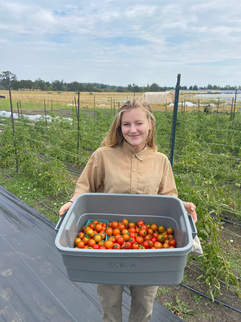Sandown Farm For School Food
- Sep 29, 2025
- 2 min read

Sandown Farm
Started in spring 2025 from pasture, the Sandown Farm is our latest initiative for food literacy education and to provide produce for school meal programs. Unlike our incubator farm program for new and young farmers starting their own farm businesses, Sandown Farm is operated by the non-profit.
Recipients have included Flourish! School Food Society, who provides school meals to 27 schools in the Capital Region, ḰELSET Elementary, Deep Cove Elementary, South Island Farm Hub, for our Wednesday on-site markets, and at the Saanich Peninsula Lions Food Bank.
Not only does the Sandown Farm provide produce for school food and others, but it also acts as a space for us to host events and workshops for community members of different ages and skill levels. This year, we have delivered our Growing Young Farmers Program to 750 youth from Kindergarten to Grade 12, and have another 415 students still to participate this Fall! We have also hosted tours, workshops, and Horticulture placement students from Horticulture Centre of the Pacific, the Camosun Horticulture Program, and Vancouver Island University.
It's safe to say we've had our hands full this year! Thank you so much to the supporters of this program, we would not be able to provide this wonderful program without you.
Victoria Foundation
First West Foundation
Farm to Cafeteria BC
United Way BC
Canada Summer Jobs
District of Sooke
Saanich Peninsula Community Foundation
Johnnys Seeds
West Coast Seeds
A private Foundation
You can also watch a video of our farmhands Raven and Fynn this summer sharing their experiences at Sandown Farm and more about the process of growing produce school meals programs on our Instagram here!
upcoming workshop
Monday, October 6th, 5:00 - 7:30pm:
Soil Management Essentials Workshop
Mary Winspear Centre - Room 3
$25 / Dinner included
Learn about soil nutrient management as a vital aspect of soil health, for both agricultural productivity and environmental sustainability. This includes learning key biological, chemical, and physical principles of soil health, analyzing recent soil nutrient tests by using case studies, and gaining knowledge on practices specific to the needs of southern Vancouver Island, enhancing crop yields and sustainability on local farms.
This workshop is facilitated by Matthew Kyriakides, a professional agrologist and trained soil scientist with over a decade of experience working in agriculture and forestry. He is also conducting PhD research at the University of Victoria on the environmental benefits and financial viability of various land care techniques at Sandown.
Read more and register here. We hope to see you there!





























Comments